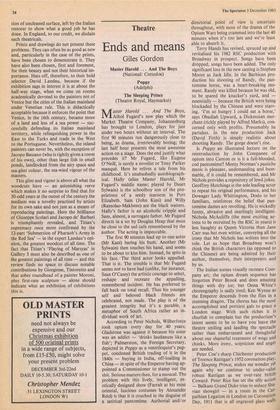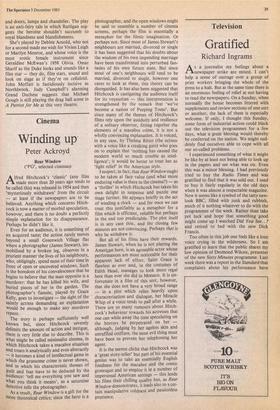Theatre
Ends and means
Giles Gordon
Master Harold ... And The Boys (National: Cot tesloe) Poppy (Adelphi) The Sleeping Prince (Theatre Royal, Haymarket)
master Harold ... And The Boys, Athol Fugard's new play which the Market Theatre Company, Johannesburg has brought to London, plays for just under two hours without an interval. The first 90 minutes run dangerously close to being, as drama, irretrievably boring; the last half hour presents the most awesome action on a stage. Does the end justify what precedes it? Mr Fugard, like Eugene O'Neill, is surely a novelist or Tony Parker manque. Here he relives a tale from his childhood. It's unabashedly autobiograph- ical. Nally (alias Master Harold, Mr Fugard's middle name; played by Duart Sylwain) is the schoolboy son of the pro- prietress of a seedy tearoom in Port Elizabeth. Sam (John Kani) and Willy (Ramolao-Makhene) are the black waiters. Hally's father is an alcoholic cripple and Sam, almost, a surrogate father. Mr Fugard directs in a set by Douglas Heap that must be close to the sad cafe remembered by the author. The acting is impeccable.
The first 90 minutes lead up to one actor (Mr Kani) baring his bum. Another (Mr Sylwain) then touches his hand, and seems to be about to kiss him. Instead, he spits in his face. The third actor looks appalled. That is it. The trouble is that Mr Fugard seems not to have had (unlike, for instance, Sean O'Casey) the artistic courage to select, reshape and recreate the appalling, remembered incident. He has preferred to fall back on total recall. Thus his younger self and beloved black friends are celebrated, not made. The play is of the greatest integrity but it's a parable, a metaphor of South Africa rather an in- dividual work of art.
According to Peter Nichols, Wilberforce took opium every day for 40 years; Gladstone was against it because his sister was an addict — 'drinks laudanum like a fish'; Palmerston, the Foreign Secretary, depicted in Poppy as a ventriloquist's pup- pet, condoned British trading of it in the 1840s — buying in India, off-loading in China — in spite of the Emperor having ap- pointed a Commissioner to stamp out the shit. Serious matters then, for a musical. The problem with this lively, intelligent, ex- otically designed show (Farrah at his most oriental, luscious costumes by Alexander Reid) is that it is couched in the disguise of a satirical pantomime. Authorial and/or
directorial point of view is uncertain throughout, with most of the drama of the
Opium Wars being crammed into the last 40 minutes when it's too late and we're least able to absorb it.
Terry Hands has revised, spruced up and revitalised his 1982 RSC production with Broadway in prospect. Songs have been dropped, songs have been added. The only significant loss in the new casting is Stephen Moore as Jack Idle. In the Barbican pro- duction his shooting of Randy, the pan- tomime horse, was a heart-breaking mo- ment. Randy was killed because he was old, to be spared the knacker's yard, and - essentially — because the British were being blockaded by the Chinese and were starv- ing. 'I'm so hungry I could eat a horse,' says Obadiah Upward, a Dickensian mer- chant (richly played by Alfred Marks), con- cerned only with profits. Presumably he partakes. In the new production Jack (David Firth) is simply realistic about shooting Randy. The gorge doesn't rise.
Is Poppy an illustrated lecture on the reintroduction by John Companee of
opium into Canton or is it a full-blooded, cod pantomime? Monty Norman's pastiche music is pleasant, undemanding and hum- mable, if it could be remembered, and Mr Nichols provides a repository of lewd jokes. Geoffrey Hutchings is the sole leading actor to repeat his original performance, and his Dowager Lady Whittington, Dodo to her familiars, reinforces the belief that pan- tomime dames are revolting. He is wickedly funny, abrasive and snarlingly intelligent. Nichola McAuliffe (the most exciting ac- tress to be recruited by the RSC in years) is less haughty as Queen Victoria than Jane Carr was but even wittier, conveying all the irony that Mr Nichols has written into the role. Let us hope that Broadway won't think the British characters (as opposed to the Chinese) are being admired by their author, themselves, their interpreters and by us.
The Indian scenes visually recreate Com- pany art; the opium dream sequence has forgotten Peter Brook and does amazing things with dry ice; but Onna White's choreography is sadly tired; Ken Wynne as the Emperor descends from the flies in a
stunning dragon. The chorus has the most accomplished and prettiest gals to grace a London stage. With such riches it is churlish to complain but the production's intent seems to be to have you leave the theatre smiling and lauding the spectacle , rather than embarrassed and thoughtful about our shameful treatment of wogs and chinks. More irony, scepticism and anger are needed.
Peter Coe's sharp Chichester production of Terence Rattigan's 1952 coronation play,
The Sleeping Prince, makes me wonder yet again why we continue to under-value robust Rattigan as we over-rate brittle Coward. Peter Rice has set the silly action — Balkans Grand Duke tries to seduce Sha- vian showgirl — in a room in the Car- pal hian Legation in London on Coronation Day, 1911 that is all engraved glass walls
and doors, lamps and chandelier. The play is an anti-fairy tale in which Rattigan sug- gests the heroine shouldn't succumb to royal blandness and blandishments.
She's played by Debbie Arnold, who not for a second made me wish for Vivien Leigh or Marilyn Monroe, and whose voice is the most erotic female instrument since Geraldine McEwan's 1958 Olivia. Omar. Sharif as the Duke looks and sounds like a film star — they do, film stars, sound and look on stlge as if they're on celluloid. John Moffatt is fastidiously incisive as Northbrook. Judy Campbell's alarming Grand Duchess suggests that Michael Gough is still playing the drag ball scene in A Patriot for Me at this very theatre.















































 Previous page
Previous page